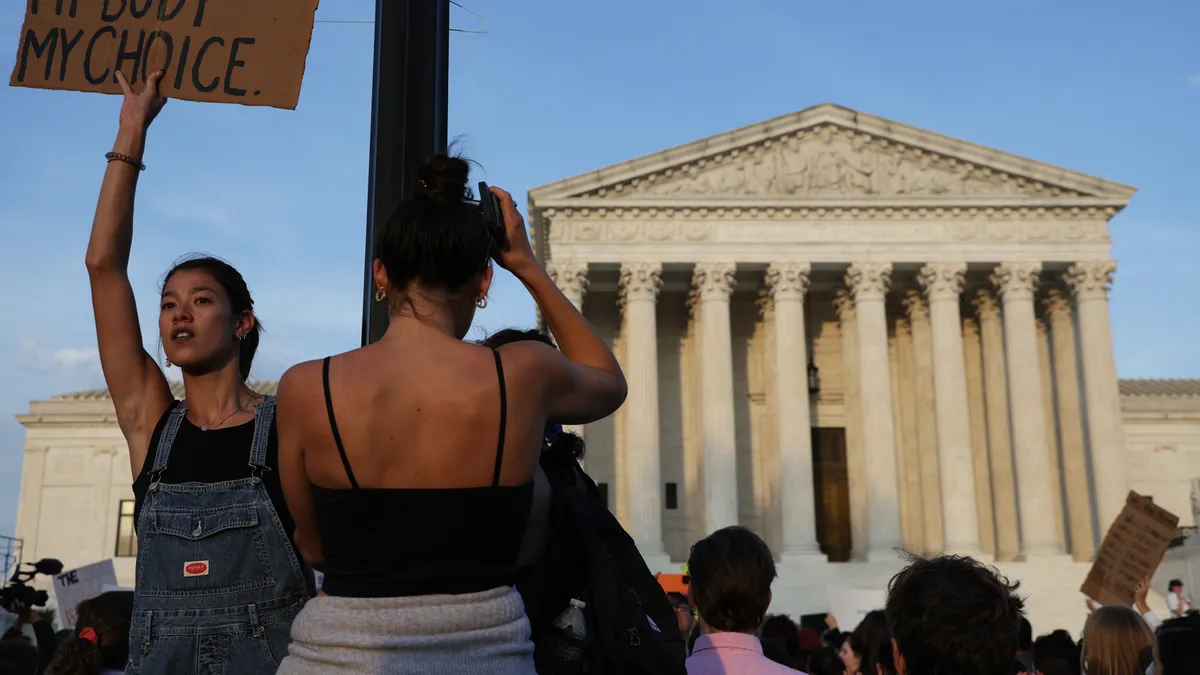When news broke that Roe v. Wade was on the chopping block — and in the days that followed the formal ruling in Dobbs v. Jackson Women’s Health Organization — major tech and retail companies rushed center stage to defend their workers’ abortion access. While Citigroup led the charge prior to the leak, Amazon and Yelp rode the momentum in April and May 2022. Ditto Starbucks.
DICK’S Sporting Goods, as well as Disney, Intuit, Meta and Zillow are also offering travel stipends. Bank of America, Goldman Sachs and JPMorgan Chase are also set to cover travel expenses. Airbnb, Alphabet, Apple, CVS, Johnson & Johnson, Microsoft and PayPal — along with Gucci, LVMH, Macy’s, Nordstrom and Target — have also joined the ranks.
How does this benefit work in practice?
Most newsmakers in this lane are offering external stipends. For example, Amazon will cover $4,000 in travel expenses; Zillow will reimburse employees up to $7,500. While employer group health plans can cover certain aspects of medical travel, the money is typically capped at an insufficient amount, experts say. Along with upping available dollars, HR pros can also opt for a supplemental reimbursement policy.
External reimbursements can get tricky, however, because they can be taxable under the Internal Revenue Code, should they exceed IRC limits. Employers then have to think about covering the subsequent taxes owed as well. For the HR pros wondering how to fold greater reproductive health coverage into employee packages, one vendor says its speciality HRA is the answer.
Personalized benefits vendor Forma announced on July 8 its Specialty Health Reimbursement Arrangement (HRA) offering. Specifically, Forma designed this defined contribution plan to cover abortions — as well as any travel-related expenses incurred that aren’t adequately covered by group medical plans.
Employers generally are permitted to offer a stand-alone HRA, but only if it is “integrated” with another health plan, Seyfarth Shaw attorneys wrote in a May blog post. Generally, that means employers could offer such a benefit to employees as long as they “(i) were offered the employer’s coverage, (ii) declined that coverage, (iii) were enrolled in other group coverage ([such as] coverage through a spouse’s plan), and (iv) were permitted to opt-out of the HRA at least annually.”
How Forma is rising to the occasion
The abortion access program that Forma leadership “spun up” came about “very quickly,” according to Jason Fan, founder and CEO of the company.
The idea to provide this benefit came together when Politico leaked Justice Samuel Alito’s SCOTUS opinion indicating an impending overturning of Roe. “We very quickly recognized that this is a topic that carries a lot of weight,” Fan said. As Forma leadership came together, they first focused on expressing empathy and understanding to employees, Fan explained. Beyond the message of support, those at Forma also realized they had the power to enact change through product offerings.
Wellness subsidies and caregiving benefits were already a part of Forma’s framework. Fan explained how HRA in the form of mental healthcare and fertility benefits were already offerings under Forma’s belt. “This actually did not require too much of a change on the product side,” he explained.
Plus, Fan said he believes in the power of adversity to fuel positive change. “I do believe that distressing times show the unity in people. It’s humbling for us to do our little part in this vast and changing world,” he continued. Cultivating a “people-first” environment, he added, usually puts business leaders down the “right path.”
Post-Roe, HR considers benefits tweaks
Following the SCOTUS leak, the Society for Human Resource Management surveyed HR professionals from late May to early June; the main reproductive benefits offered at the time were PTO to access reproductive health care (32%), and unpaid time off (18%) or PTO (15%) to attend protests.
In light of Dobbs , 7% of respondents told SHRM they might now offer PTO to access reproductive care. Likewise, 6% said they would offer travel expense benefits outside of their employees’ HSA.
Notably, 35% of respondents said they would not be more likely to offer abortion travel reimbursement outside of an HSA. Eighty-seven percent of respondents also said they weren’t interested in altering their HSA contributions should employees be able to use those for abortion travel.
How this shift is a natural fit
Perhaps abortion travel coverage may have seemed far-fetched for many HR leads or benefits professionals two years ago. But in many ways, Fan suggested, this expansion of employer-led health advocacy is a natural next step for many resources providers. “We want to be there, to support all of our employees,” he said.
Going a step further, Fan added, “When we get a chance to talk to HR and benefits professionals, they are some of the most loving and caring individuals that I will ever get to talk to in my life.” Ultimately, Fan said, he and his team at Forma “are very excited and very humbled to be able to offer that symbol for the customers.”
“We’re just a tool,” Fan said.






















